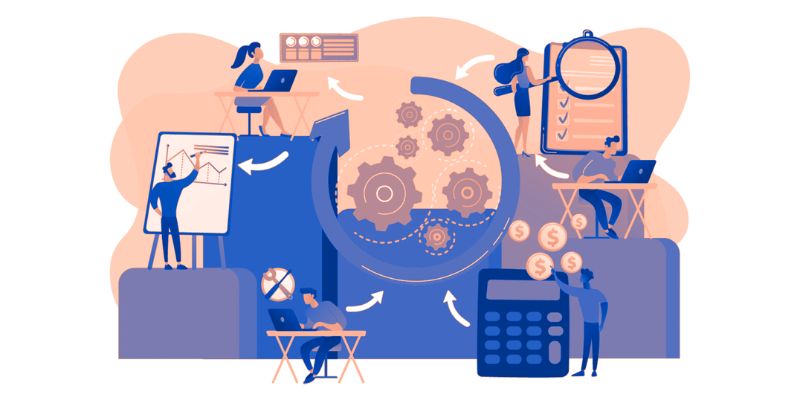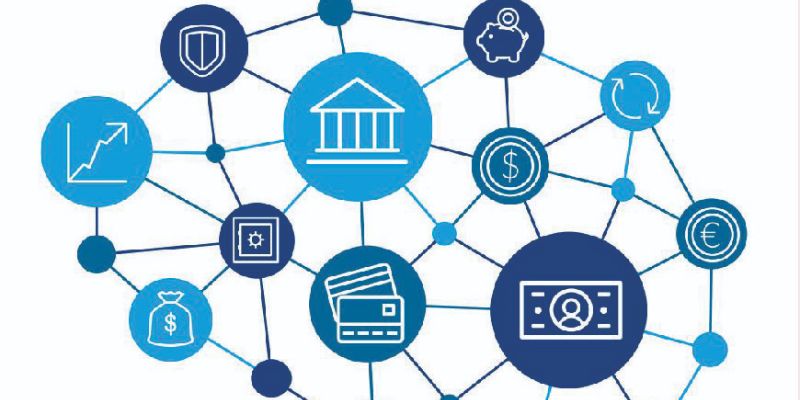Imagine a world where you call the shots in your financial world, a place where the pesky middlemen who nickel and dime you at every turn are no more. That’s the bright and bold promise of The future of financial disintermediation. It’s not just a buzzword; it’s the new reality we’re stepping into as tech rewrites the rules. Think banks without the endless lines, loans without the hoops to jump through, and your money moves free and fast. It’s about banking, but not like it’s been—it’s banking reimagined. Get ready to dive in first with me as we unpack how blockchain is not just a fad but a finance game-changer, how your digital cash is growing up, and how tomorrow’s banks might look nothing like the ones we know. This is where you learn to take control. Let’s explore how the very fabric of transactions, lending, and even the tech behind your money is evolving—and what it means for your wallet.
Understanding the Blockchain Revolution in Banking
The Transition to Decentralized Finance Systems
Banks have always been the go-to for money matters. But blockchain is a game changer. It means no more middlemen. That’s a huge shake-up in banking. People now lend to each other, bypassing traditional banks. This peer-to-peer lending is growing fast. Why is it big? Because it’s simple and faster. And often, it’s cheaper too.
Decentralized finance, or DeFi for short, takes this further. It builds a whole system for money without banks. Using blockchain, DeFi lets money flow more freely. It’s secure and works around-the-clock. This is a big jump from the old way banks work.
Cryptocurrencies Changing the Landscape of Transactions
Imagine sending money as easy as a text. That’s what cryptocurrency does. It’s digital money but without banks. People worldwide buy and sell with it. No waiting for bank approvals. No need for exchange rates. Cryptocurrencies skip over traditional steps, making transactions quicker.
They do more than just move money. They can change rules. Smart contracts on blockchain do deals and agreements all by themselves. When conditions are met, they automatically do what’s been agreed. No need for a person to check.
This shakes up how we think about money and banking. It’s like having a bank in your pocket. Businesses, too, are catching on. They’re using cryptocurrencies to pay for things, even to invest. Traditional banks are noticing. They’re starting to use blockchain and cryptocurrencies too.
The rise of mobile payment systems and digital wallets makes this even easier. They let you pay with a tap or a click, anywhere, anytime. This is the new face of money.
Big tech companies are also stepping in. They’re mixing tech and finance. They’ve got the know-how to handle data safely. They’re making financial transactions quicker and more user-friendly.
The change is happening now, and it’s fast. Banks are no longer the only option. In a world where technology leads, money moves in new ways. And it’s all down to blockchain.
In this new world, regulations try to keep up. They aim to make sure everything stays safe and fair. But with technology speeding ahead, this is a real race.
Looking ahead, the question is, will banks adapt quickly? Or will they be left behind in this blockchain revolution? With blockchain, banking is turning on its head. It’s a thrilling time in finance. Let’s see how far and fast we can go.

The Evolution of Peer-To-Peer Models
Peer-to-Peer Lending and Alternative Financing
Once, getting a loan meant lining up at a bank and hoping for approval. Not anymore! Peer-to-peer (P2P) lending lets people borrow directly from others, cutting out banks altogether. With websites for this, anyone with money can lend, and anyone needing money can borrow. It’s cool because it’s simple and open to more people. You can borrow money for anything – fixing your car, starting a business, or even buying a new fridge!
But what is P2P lending growing so fast? Trust in new tech and the web means we’re okay with online money deals. With tech getting better, P2P lending and other online money solutions are growing super fast. They are like the playground slides everyone wants to try – easy to use and so much fun.
And there’s more. Digital money and systems without a boss (decentralized) are getting bigger, thanks to blockchain – a tech that keeps money safe. More of us are cool with getting and spending money online. The internet is the new mall, and our phones are the wallets.
The Emergence of Neobanks and Their Impact
Have you heard about neobanks? They’re like banks but only online! Without real branches, they let us do money stuff anytime, anywhere. We can pay bills in bed or save cash while in pjs. They don’t follow old rules and people really dig them, especially younger folks.
Neobanks are booming because they’re easy and don’t need lots of paperwork. You tap on your phone a few times and poof, you have a bank account! They help us save fees and see our spending clearly. Think of them as your money’s new best friend, always there for you, rain or shine.
Because they’re just online, neobanks can do things faster and cheaper. They’re shaking up old banks like a game of tag. This is super important because old banks sometimes seem to move like turtles. With neobanks joining the race, they’ll have to sprint like hares now.
With money, we used to rely only on banks. That’s changing as we get more ways to bank and borrow. P2P lending is like the awesome new toy, and neobanks are the cool kids on the block. What’s clear is this: the ways of banking we knew are changing big time. And they’re becoming fairer, faster, and fit more for our times. It’s like we’re all playing a giant game of Moneyball, and the players are just warming up.

Innovation and Regulation in FinTech
Navigating the Challenges of Fintech Startups
In fintech, startups often face big hurdles. Money matters are tough to change. People trust old banks more than new apps for their cash. But these startups are trying to do just that. They say, “Hey, we can handle your money in smarter ways!” They use cool tech like AI to make banking quick and easy. Some help you send money across the world cheaply. Others let you get loans without waiting in big lines at the bank.
Fintech is like a tool kit full of fun gadgets for money stuff. It has neobanks, which are banks you can’t walk into because they’re just on your phone. And there’s more! We’ve got peer-to-peer lending, meaning you can loan money to others or get a loan yourself without the bank in the middle. Plus, there are digital wallets that turn your phone into a money-holding wizard.
One big idea fintech loves is blockchain. It’s a super safe way to keep track of money that doesn’t need big banks to check everything. This means that when you use cryptocurrency, like Bitcoin, you’re saying bye-bye to middlemen.
As you can imagine, old banks are watching this show with a worried look. “How will we keep up?” they wonder. These smart fintech firms are sprinting while old banks are still tying their shoelaces.
Yet, it’s not all fun and games. These new kids on the block must play by rules too. There are laws for keeping money safe. Fintech startups must make sure they don’t cross the line while bringing fresh ideas to life. This dance with rules is tricky but super important.
The Implications of Big Tech Entry into Finance
Here comes another twist! Big tech firms, like those who make your phones and run huge online shops, also want a slice of the finance pie. They’ve seen fintech shaking up the banking world and thought, “We can do this too!” Since everybody uses their gadgets and shops with them, they have a lot of power to change how we use money.
But wait, there’s more. With these giants stepping into the ring, they could help or hurt the little fintech firms. They have tons of cash and lots of smart people who know how to get folks excited about new things. That’s rough for fintech startups. But big tech also has a lot of eyes on them. Governments are like “We see you” and watch them closely. They must play nice and fair.
These tech titans could make things happen that we’ve only dreamed of. Imagine shopping online and paying with your face – no more typing in card numbers! Yet, they have to think about trust too. People need to feel their money is safe with tech companies just like they do with banks.
When big tech meets finance, it’s a game-changer. But it must win people’s trust, and that’s no small feat. It’s a world where who has the best ideas and who plays by the rules will win the money game. It’s wild, it’s exciting, and it’s changing every day.

The Role of Technology in Shaping Financial Services
Machine Learning in Credit Scoring and AI in Planning
Machine learning has changed how banks score credit. It allows quicker, fairer loan decisions. With AI, banks now predict your money needs in advance. They can help you plan ahead and even avoid debt. This tech makes banking smarter and more helpful for you.
Machine learning is a type of AI. It uses data to learn and get better over time. When it comes to credit scores, it looks at your past and present data. It finds patterns that humans might miss. This helps banks see who’s likely to pay back loans.
But, machine learning isn’t perfect. AI is only as good as the data it gets. If the data is bad, decisions may be unfair. That’s a big deal for people getting loans. Banks work hard to keep data clean and fair. They want to make the best choices for everyone.
Banks also use AI to see where you might need money in the future. Maybe you’ll want to buy a house or go to college. Banks can offer advice on saving or finding the best loans. AI makes planning feel less scary. It’s like having a smart friend to guide your money choices.
Moving Towards a Cashless Society: Risks and Benefits
Fewer people use cash now. More of us tap phones to pay. We’re moving to a “cashless” world fast. This means easy shop trips and no loose change in pockets. It’s speedy, safe, and super handy.
But, what if tech fails? Or hackers attack? We’ve got to be careful. Going cashless has risks. Not everyone is ready for it. Some folks still need coins and bills. They might be older or not trust banks. We should help them as we move to no cash.
There are big wins to a cashless world. It’s harder for thieves to take your money. You can’t drop a digital dollar. It’s cool to buy things quick with just a tap. Tech keeps track of every dime, so you don’t lose track.
In a cashless place, banks fight less fraud. Fake bills? Gone. It’s easier to see who’s spending what. This all means good things for your pocket. It means businesses can work quicker too. Tech makes it all better, as long as it’s used right.
So, tech in money is a big deal. It helps us, but we’ve got to use it smart. With AI and no cash, we get a future that’s smooth and safe. Banks and tech together make money easy and fun. But we can’t forget those who need a bit more help. We move forward, step by step, making it good for everyone.
In this post, we dived into how tech shakes up banking. We saw how blockchain sparks a switch to systems where no single point controls the money. Digital coins make paying and getting paid different. We explored how people lend money to each other, and how new banks without buildings are growing.
Then, we looked at new kids on the finance block and how they deal with rules. We also saw big names in tech getting their hands on our cash. Last, we checked out smart tech that decides who gets loans and how we might not use cash much longer.
All this shows money matters are changing fast, and we need to keep up. New tech means new ways to think about our cash. Let’s stay smart and make these tools work for us.
Q&A :
What is financial disintermediation and how will it evolve?
Financial disintermediation refers to the process where consumers or businesses bypass traditional financial intermediaries, such as banks, to either invest or borrow directly. This trend is poised to evolve with technological advancements, such as blockchain and peer-to-peer lending platforms, further streamlining financial transactions and empowering individuals with more control over their financial dealings.
How will blockchain technology affect financial disintermediation in the future?
Blockchain technology is expected to play a significant role in the future of financial disintermediation by providing a secure, decentralized, and transparent framework for executing and recording transactions. This can potentially reduce the need for traditional financial institutions, lower transaction costs, and increase efficiency in financial services.
What impact could peer-to-peer (P2P) lending platforms have on the traditional banking industry?
Peer-to-peer lending platforms may significantly impact the traditional banking industry by providing a direct channel for borrowers and lenders to transact without the need for a bank as an intermediary. This can lead to more competitive interest rates, personalized lending and borrowing experiences, and potentially disrupt the revenue models of conventional banks.
Can financial disintermediation lead to better financial inclusion?
Financial disintermediation has the potential to lead to better financial inclusion by offering more accessible financial services to underserved populations. Innovations such as mobile money and microfinance institutions are already demonstrating how disintermediation can help bring financial services to people who previously lacked access to traditional banking.
Are there risks associated with financial disintermediation?
As with any financial innovation, there are risks associated with financial disintermediation, including regulatory challenges, cybersecurity threats, and potential for increased financial instability. It is essential for regulatory frameworks to evolve in tandem with these changes to protect consumers, ensure fair practices, and maintain the integrity of the financial system.

